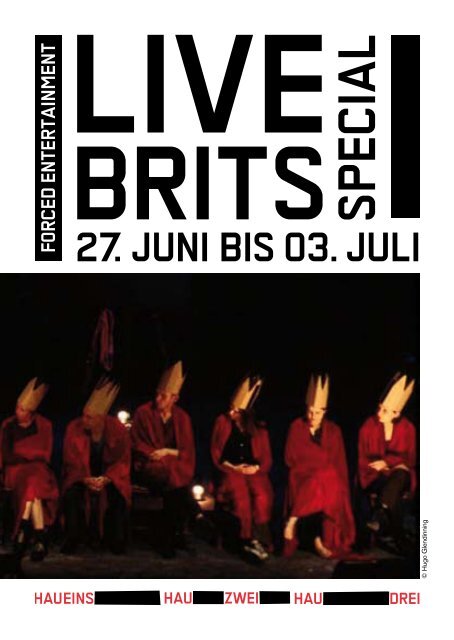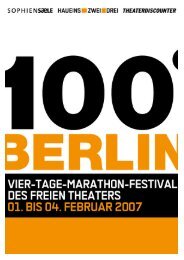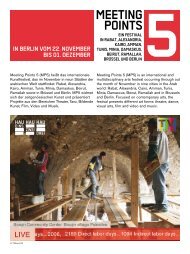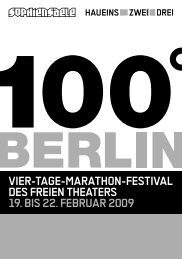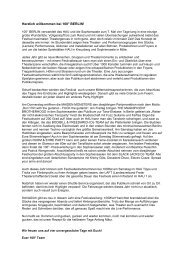G - hebbel am ufer
G - hebbel am ufer
G - hebbel am ufer
Sie wollen auch ein ePaper? Erhöhen Sie die Reichweite Ihrer Titel.
YUMPU macht aus Druck-PDFs automatisch weboptimierte ePaper, die Google liebt.
© Hugo Glendinning
Baudelaire sagte, die elementare Beziehung des Kindes<br />
zum Spielzeug münde in die Frage: „Wie kriege ich das<br />
kaputt?“<br />
Inspiriert von diesem Geist und mit dem Ziel, das Theater<br />
radikal in Frage zu stellen, gründete sich 1984 Forced<br />
Entertainment. Die Mission: Erkundung von Landschaft<br />
und Identität der Gegenwart sowie eine verspielte und<br />
an die Grenzen gehende Betrachtung der Systeme<br />
Sprache und Theater.<br />
2009 widmet sich die Live Brits Special Ausgabe dem<br />
Bruch mit dem Theater - durch Überladung, Dehnung,<br />
Vereinfachung, Beschleunigung und Verlangs<strong>am</strong>ung. In<br />
diesem Kontext wird Forced Entertainment einige jüngere<br />
Arbeiten vorstellen sowie eine eigene Version von<br />
„Exquisite Pain“, einer Liebesgeschichte der Konzeptkünstlerin<br />
Sophie Calle und den faszinierend-kämpferischen<br />
sechsstündigen Erzählmarathon „And On The<br />
Thousandth Night...“. Ganz aktuelle Arbeiten sind das<br />
grafische Live-Hörspiel „Void Story“ und „Sight is the<br />
Sense …“, mein Monolog für den <strong>am</strong>erikanischen Schauspieler<br />
Jim Fletcher. Die Neuerfindung des Theaters<br />
bleibt die Aufgabe, für die sich Forced Entertainment auch<br />
in dieser Saison stark macht. Ein Weg, Bühne und<br />
Performance im Kontext der Gegenwart neu zu verorten.<br />
Tim Etchells, Mai 2009<br />
2009. 25 Jahre Forced Entertainment. 1984 gründen<br />
sechs Absolventen der Universität ein Ensemble, das für<br />
eine einzigartige künstlerische Partnerschaft steht und<br />
ein Vierteljahrhundert lang immer wieder seine Position als<br />
Pionier des zeitgenössischen Theaters be kräftigt hat.<br />
Der umfangreiche Werkkanon der Truppe stellt die Mechanik<br />
der Performance ebenso ins Zentrum wie die Rolle<br />
des Publikums und die Ränkespiele des modernen urbanen<br />
Lebens. Prägender Kopf und engagierter Vermittler<br />
von Forced Entertainment ist der künstlerische Leiter<br />
des Te<strong>am</strong>s, Tim Etchells. Die Projekte der Gruppe sind<br />
distinkt, provokant, pflegen den Bruch mit den Konventionen<br />
des Theaters und den Erwartungen des Publikums.<br />
Forced Entertainment steht für einen Prozess der<br />
Kooperation - Gruppenarbeit, Improvisation, Experiment<br />
und Debatte - und wurde d<strong>am</strong>it im britischen Avantgardetheater<br />
ebenso wegweisend wie zu einem nicht mehr wegzudenkenden<br />
Faktor auf internationalen Bühnen.<br />
Forced Entertainment sind Robin Arthur, Tim Etchells<br />
(Künstlerischer Leiter), Richard Lowdon (Designer),<br />
Claire Marshall, Cathy Naden and Terry O’Connor.<br />
Forced Entertainment werden regelmäßig unterstützt vom Arts Council England und<br />
vom Sheffield City Council.
Die Performer, mit billigen roten Umhängen und Pappkronen<br />
als Könige und Königinnen verkleidet, bilden eine<br />
Reihe. Sie erzählen eine Geschichte: improvisiert und<br />
aus dem Gedächtnis. Es ist eine lange, sich verändernde<br />
Geschichte ohne Ende, die sich schließlich selbst aufhebt.<br />
Es ist eine Geschichte, die in ihren vielen Wendungen<br />
und Windungen viele, vielleicht alle Geschichten dieser<br />
Welt umfasst.<br />
„And On The Thousandth Night…“ ist ein Remix von Filmstories,<br />
religiösen Legenden, Folklore, Witzen, modernen<br />
Mythen, persönlichen Geschichten, Grusel geschichten,<br />
Liebesgeschichten und Sexgeschichten, bis hin zu<br />
banalen und außergewöhnlichen Erzählungen und Märchen<br />
für Kinder.<br />
Immer wieder fallen sich die konkurrierenden Monarchen<br />
ins Wort. Sie übertreiben, greifen die Erzählungen der<br />
anderen auf, betten sie in ihre Geschichten ein und führen<br />
sie weiter. Ihre Erzählung schwankt zwischen Müdigkeit und<br />
Überdrehtheit, absurder Alltäglichkeit und überraschender<br />
Zärtlichkeit. Gelegentlich machen sie eine Pause, legen<br />
sich im Hintergrund zum Schlafen nieder. Andere bleiben<br />
auf der Bühne, erzählen weiter. Nach einigen Stunden<br />
sind vielleicht nur noch zwei Könige übrig. Sie schreiben<br />
die Geschichten nun als eine fort. Die ande ren Performer<br />
treten vor und schließen sich der Reihe wieder an.<br />
„And On The Thousandth Night…“ ist inspiriert von den<br />
Geschichten aus Tausendundeiner Nacht. Das Werk<br />
entstand im September 2000 für das Festival Ayloul in<br />
Beirut. Unter Rückgriff auf einen Ausschnitt von „Who<br />
Can Sing A Song To Unfrighten Me?“, einer epischen<br />
24-Stunden-Performance von Forced Entertainment, erkundet<br />
das Projekt die lebendige Beziehung zwischen<br />
Story und Publikum, zwischen Erzählung und Erzähler und<br />
schafft d<strong>am</strong>it ein einzigartiges Theatererlebnis. Die Performance<br />
dauert sechs Stunden. Das Publikum kann nach<br />
Belieben kommen und gehen.<br />
aus „Void Story“ © Tim Etchells
„Void Story“ begleitet die Protagonisten auf einer Achterbahnfahrt<br />
durch die wenigen verbliebenen Reste der<br />
modernen Kultur. Auf der Reise durch heruntergekommene<br />
Stadt landschaften, überfallen und von Insekten attackiert,<br />
verfolgt durch unterirdische Tunnelsysteme, eingesperrt<br />
in Kühltransporter, untergebracht in gruseligen Hotels<br />
und verloren in der Wildnis, in Seitenstraßen und verwirrenden<br />
Rummelplätzen, ziehen sie durch eine sternlose,<br />
dunkel-düstere Nacht.<br />
Forced Entertainment präsentiert die trostlose und zugleich<br />
komische zeitgenössische Fabel „Void Story“ als Hörspiel.<br />
Die Künstler sitzen an Tischen und blättern in den<br />
Seiten des Drehbuchs, ‚übernehmen’ die verschiedenen<br />
Sprechrollen und Soundeffekte: Schüsse, Regen,<br />
schlechte Telefonverbindungen. Die leere Bühne wird<br />
dominiert von projizierten Bildern, die das Storyboard für<br />
eine unmögliche Filmver sion des großartig beunruhigenden<br />
Textes von Tim Etchells darstellen. Irgendwo zwischen<br />
Live-Dialog, aufgezeichneten Soundeffekten und<br />
Bildcollagen, die die Erzählung visualisieren, wird die<br />
„Void Story“ Wirklichkeit.<br />
„Void Story“ entstand für das SPILL Festival mit Unterstützung vom Tanzquartier Wien<br />
und Tate Media<br />
aus „Void Story“ © Tim Etchells
„Strümpfe sind Handschuhe für die Füße. Schnee ist kalt.<br />
Wasser ist das gleiche wie Eis. In Amerika ist alles größer.<br />
Amerika ist ein Land. Korea ist auch ein Land. Manche<br />
Männer sind sexy. Blinde können nichts sehen. Einbrecher<br />
sind Menschen, die in Häuser eindringen und Sachen<br />
nehmen, die nicht ihnen gehören. Dunst ist Rauch ohne<br />
Feuer. Das Telefon ist eine fantastische Erfindung. Für<br />
manche ist eine tote Maus ein Präparat. Liebe lässt sich<br />
nur schwer beschreiben. Wenn Dinge sehr heiß werden,<br />
brennen sie.“<br />
„Sight is the Sense that Dying People Tend to Lose First“<br />
ist ein langer Monolog in freiem Assoziieren, der von<br />
Thema zu Thema stolpert. So entstehen eine gigantische<br />
Iteration des Scheiterns und zugleich eine Erklärung<br />
der Welt und ihrer Dinge, Kräfte, Erfahrungen, Menschen<br />
und Landschaften, Erläuterungen zu ihrem Wesen und<br />
Funktionieren.<br />
In der Erkundung der Prozesse des Beschreibens und<br />
Definierens der Welt durch Sprache und der Wege, auf<br />
denen sich das eins<strong>am</strong>e, sprechende Subjekt dieser<br />
Aufgabe stellt, nimmt sich „Sight is the Sense…“ einer<br />
Mission an, die von Anfang an und auf geradezu skurrile<br />
Art und Weise zum Scheitern verurteilt ist. Strukturiert als<br />
in den Wahnsinn treibende Anhäufung nebeneinander<br />
stehender Fakten lässt die Performance – per definitionem<br />
ein virtuoses Stück Erin nerung – den Zuschauer sich<br />
der Lücken in seinem Verständnis der Welt bewusst werden.<br />
Er erkennt die narrativen und konzeptionellen<br />
Möglichkeiten, die in der sich er gebenden Folge von<br />
dissoziativen Fakten und Meinungen entstehen.<br />
„Ein Tisch hat vier Beine. Eine Gefängniszelle hat vier Ecken.<br />
Ein Fenster ist eine Öffnung in der Wand eines Raumes,<br />
von Menschen gebaut, die hinausblicken wollen. Eine Geisel<br />
ist ein Gefangner, mit dem man handeln möchte. Ein<br />
Handel ist eine Vereinbarung oder ein Arrangement, in der<br />
jeweils eine Person etwas hat, was die andere haben<br />
möchte, und umgekehrt. Man verständigt sich auf einen<br />
Tausch, und beide sind zufrieden. Ein Pfurz ist Gas, das<br />
aus einem Körper entweicht. Folter ist eine Methode, Menschen<br />
zu verletzen, weil man davon überzeugt ist, dass sie<br />
dann Dinge sagen, die man hören will. Unter bestimmten<br />
Umständen stürzen manche Brücken ein. Die Ozonschicht<br />
schützt uns vor den Sonnenstrahlen. Löwen, Pferde und<br />
Frauen sind reizvolle Modelle für Statuen.“<br />
Jim Fletcher arbeitet seit langem mit Richard Maxwell und<br />
den New York City Players. Gemeins<strong>am</strong> touren sie seit<br />
fast zehn Jahre in Europa und den USA, zuletzt mit „Ode<br />
to the Man Who Kneels“. Fletcher spielte außerdem in<br />
der Elevator Repair Service Produktion „Gatz“. Er ist häufig<br />
Gast bei den Film- und Performance-Projekten der<br />
New Yorker Galerie Participant, Inc. und arbeitete als<br />
Autor für Bernadette Corporation.<br />
Produziert von Forced Entertainment, beauftragt von Tanzquartier Wien
„Ich beschloss, weiterzumachen, bis ich meinen Schmerz<br />
überwunden hatte, weil ich ihn mit dem Schmerz anderer<br />
verglich, oder weil ich meiner eigenen Geschichte allein<br />
durch die Wiederholung überdrüssig geworden war.“<br />
„Exquisite Pain“ ist ein ungewöhnlich einfaches, sehr intimes<br />
Stück für zwei Performer, mit Texten und Bildern<br />
von Sophie Calle. Zum ersten Mal arbeitet die Gruppe mit<br />
einem bestehenden Script. Dabei handelt es sich nicht<br />
um ein Stück aus dem Bühnenkanon, sondern vielmehr<br />
um eine Vorlage der französischen Konzeptkünstlerin,<br />
deren herausragende Arbeit die Grenzen von bildenden<br />
Künsten, Performance und dem wahren Leben auslotet.<br />
Ein Mann und eine Frau sitzen an identischen Tischen und<br />
erzählen Geschichten von gewöhnlich und nicht-so-<br />
gewöhnlich gebrochenen Herzen. Jede Geschichte wird<br />
von einem ikonischen Bild begleitet. Die Frau erzählt<br />
immer wieder von Trennung; die Trauer <strong>am</strong> Ende der Affäre,<br />
immer wieder anders erinnert. Im Gegensatz zu dieser<br />
obsessiven Wiederholung erzählt der Mann viele verschiedene<br />
Geschichten aus dem Leben anderer Menschen.<br />
Jede seiner Geschichten ist ein narrativer Schnappschuss<br />
der kleinen oder großen Sorgen, die sich im umfassenden<br />
Katalog des Elends, der Trennung, der Erniedrigung,<br />
des Sterbens finden. Sein Thema sind sowohl Krankheiten<br />
als auch Liebesbriefe, die ihre Adressaten nie erreichen.<br />
„Exquisite Pain“ erkundet, wie die Kraft der Sprache Ereignisse<br />
bewahrt oder löscht und wie der Mensch das<br />
Trauma verarbeitet. „Exquisite Pain“ handelt vom Erinnern<br />
und Vergessen, von Liebe und Verlust, von den Geschichten,<br />
die wir uns selbst nach dem Scheitern erzählen.<br />
Sophie Calles Werk entstand, als sie vor zwanzig Jahren<br />
vor den Trümmern einer einst großen Liebe stand. Sie<br />
bewältigte ihren Kummer, indem sie 99 Menschen, denen<br />
sie begegnete, ihr Leid klagte. Dann bat sie ihre Zuhörer,<br />
von ihren schlimmsten Momenten zu berichten. Daraus<br />
entstanden 99 Geschichten von tiefer Trauer. Auf dieser<br />
Vorlage basiert diese Forced Entertainment-Produktion.<br />
Eine Inszenierung und ein Spiel mit der Macht des Gedächtnisses<br />
und der Wirkmächtigkeit des Wortes.<br />
„Exquisite Pain“ ist eine Koproduktion von Theater der Welt 2005 (Stuttgart), BIT<br />
Teatergarasjen (Bergen), The National Museum of Art, Design and Architecture (Oslo),<br />
Kaaitheater (Brüssel), La Filature, scène nationale de Mulhouse und Tanzquartier Wien.<br />
© Sophie Calle
Impressum:<br />
Hrsg. Hebbel <strong>am</strong> Ufer<br />
Künstlerische Leitung: Matthias Lilienthal, Kurator „Live Brits“: Matthias Lilienthal<br />
Produktionsleitung: Elisabeth Knauf<br />
Redaktion Progr<strong>am</strong>mheft: Katrin Dod, Übersetzung Englisch-Deutsch: Astrid Geese<br />
Grafik: Double Standards Berlin, Druck: Druckerei Conrad<br />
Technik Forced Entertainment: Ray Rennie, Elb Hall and John Avery.<br />
Technik HAU: Susanne Görres, Annette Becker, Dorothea Spörri (Technische Ltg.); Maria<br />
Kusche (Assistenz); Micky Esch, André Schulz (Technische Ltg. HAU 2); Bühnenmeister:<br />
Wolfgang Meiners, Andrea Schöneich; Bühne: Jörg Fischer, Darek Gomulkiewicz,<br />
Wolfgang Lehmann, Piotr Rybkowski, Marc Seiffert, Claire Sievers; Licht: Piet Esch,<br />
Veit Gries, Ulrich Kellermann, Ruprecht Lademann, Ingo Ruggenthaler, Marc Zeuske;<br />
Ton: Rainer Grandt, Matthias Kirschke, Ralf Krause; Azubis: Anna Lienert, Max Wegner<br />
Medienpartner:
© Sophie Calle<br />
“Exquisite Pain” is co-produced by Theater der Welt 2005 (Stuttgart), BIT Teatergarasjen<br />
(Bergen), The National Museum of Art, Design and Architecture (Oslo), Kaaitheater<br />
(Brussels), La Filature, scène nationale de Mulhouse, and Tanzquartier Wien.<br />
Sophie Calle’s original work was the product of a period<br />
of intense grief she experienced 20 years ago when a<br />
relationship broke up. Her way of dealing with this was to<br />
recount her misery to everyone she met – 99 times –<br />
and then asking them to share their worst moments with<br />
her, thus 99 stories of powerful grief emerged. Forced<br />
Entertainment base their work on this, exploring how the<br />
forces of language, memory and forgetting move to<br />
contain, preserve or erase events.<br />
that never arrive.<br />
“Exquisite Pain” explores how the forces of language,<br />
memory and forgetting move to contain, preserve or<br />
erase events, how as a person one comes to terms with<br />
trauma. “Exquisite Pain” is about remembering and<br />
forgetting, about love and about loss, about the stories<br />
we tell ourselves when things have gone wrong.<br />
“Exquisite Pain” is an extraordinarily simple and intimate<br />
piece for two performers using text and images by Sophie<br />
Calle. This is the first time the company have worked<br />
with an existing text as source material – not a play from<br />
the theatrical cannon, but rather text and images by the<br />
French conceptual artist Sophie Calle whose extraordinary<br />
work has long attempted to blur the boundaries of visual<br />
art practice with performance and real life.<br />
A man and a woman sit at identical tables and tell stories<br />
of ordinary and not-so-ordinary heart-break, each story<br />
accompanied by a single iconic image. The woman narrates<br />
repeatedly the story of a break up; the suffering<br />
at the end of an affair, each time remembering differently.<br />
In contrast to this obsessive repetition the man tells many<br />
different stories collected from the lives of other people;<br />
each story a snapshot narrative of sorrow, big or small,<br />
that takes its place in a growing catalogue of suffering,<br />
break-ups, humiliations, deaths, illnesses and love letters<br />
“I decided to continue… until I had got over my pain by<br />
comparing it with other people’s, or had worn out my own<br />
story through sheer repetition”
Produced by Forced Entertainment, commissioned by Tanzquartier, Vienna<br />
Jim Fletcher is a long-time performer with Richard Maxwell<br />
and the New York City Players, with whom he has toured<br />
Europe and the United States for almost ten years, most<br />
recently in “Ode to the Man Who Kneels”. He is part of<br />
Elevator Repair Service's production of “Gatz”. He often<br />
appears in the film and performance pieces of Participant,<br />
Inc. gallery in New York, and as a writer has worked<br />
closely with Bernadette Corporation.<br />
“A table has four legs. A prison cell has four corners. A<br />
window is an opening in the wall of a room built by<br />
people who want to see outside. A hostage is a prisoner<br />
used to bargain with. A bargain is a deal or an arrangement<br />
where one person has one thing and the other wants it<br />
and the first person has something that the other wants<br />
and they make an exchange so that each is more happy.<br />
A fart is gas that escapes from a body. Torture is a way<br />
of hurting people, in the belief that this will make them<br />
tell you things you need to know. Some bridges fall down<br />
under specific circumstances. A layer of ozone protects<br />
us from the rays of the sun. Lions, horses and women can<br />
make interesting subjects for statues.”<br />
viewer highly aware of the gaps in its grasp on the world,<br />
and in the narrative and conceptual possibilities created<br />
through its evolving sequencing of dissociated facts<br />
and opinions.<br />
Exploring the processes of describing and defining the<br />
world through language and the ways in which a lone<br />
speaking subject might approach this task “Sight is the<br />
Sense…” embarks on a mission that is comically<br />
doomed from the outset. Structured as a maddening<br />
accumulation of un-linked facts, the performance –<br />
a virtuoso piece of recall by any definition – makes the<br />
“Sight is the Sense that Dying People Tend to Lose First”<br />
is a long free-associating monologue that tumbles from<br />
topic to topic to create a vast, failing iteration and explanation<br />
of the world, the things, forces, experiences, people<br />
and landscapes in it - what they are and how they work.<br />
“Socks are gloves for the feet. Snow is cold. Water is the<br />
s<strong>am</strong>e thing as ice. In America things are bigger. America<br />
is a country. Korea is also a country. Some men have sex<br />
appeal. Blind people cannot see anything. Burglars are<br />
men that go into houses and take things which do not belong<br />
to them. Mist is like smoke but it comes without<br />
fire. The telephone is an <strong>am</strong>azing invention. A mouse that<br />
is dead is sometimes referred to as a specimen. Love<br />
is difficult to describe. Fire is what happens when things<br />
get very hot.”
aus „Void Story“ © Tim Etchells<br />
“Void Story” was made for SPILL Festival 2009 with support from Tanzquartier, Vienna<br />
and Tate Media<br />
‘doing’ the requisite voices and adding in sound effects<br />
for gunshots, rain and bad phone-lines. Simultaneously<br />
the otherwise empty stage is dominated by a series of<br />
projected images, a storyboard for an impossible movieversion<br />
of Tim Etchells’ uniquely unsettling text. Somewhere<br />
between the live dialogue, the recorded sound<br />
effects and the collaged images attempting to visualise<br />
the narrative, is where “Void Story” actually takes place.<br />
Forced Entertainment perform the bleak and comical<br />
contemporary fable of “Void Story” as if it were a radio<br />
play, sitting at tables, turning the pages of the script,<br />
“Void Story” follows a beleaguered pair of protagonists on<br />
a rollercoaster ride through the decimated remains of<br />
contemporary culture. Navigating one terrible cityscape<br />
after another, mugged, shot at and bitten by insects,<br />
pursued through subterranean tunnel systems, stowed<br />
away in refriger ated transport, shacked up in haunted<br />
hotels and lost in wildernesses, backstreets and bewildering<br />
funfairs, they travel to the centre of a night so intense<br />
that there are no stars to be seen.
aus „Void Story“ © Tim Etchells<br />
“And On The Thousandth Night…” takes its title and part<br />
of its inspiration from The Thousand & One Nights. It<br />
was created in September 2000 for Festival Ayloul in Beirut.<br />
Drawing on one section from Forced Entertainment's<br />
epic 24 hour performance “Who Can Sing A Song To<br />
Unfrighten Me?”, the performance explores the live<br />
relationship between the story and its public, between the<br />
story and its tellers, creating a unique theatrical experience.<br />
The performance lasts six hours, and the audience<br />
members are free to come and go as they wish.<br />
moving on. The tales move between tiredness and hysteria,<br />
between absurd vulgarity and surprising tenderness. At<br />
times some of the Kings and Queens take a break, sleeping<br />
on the floor at the back of the space whilst their colleagues<br />
continue. After several hours, perhaps, there<br />
are only two kings left speaking, pushing on the tale as<br />
one by one the others come forwards to rejoin the line.<br />
The Kings and Queens compete, interrupting, exaggerating,<br />
taking over each other's stories, incorporating and<br />
“And On The Thousandth Night…” remixes everything from<br />
film plots, to religious stories, to traditional tales, jokes,<br />
modern myths, through personal stories, scary stories, love<br />
stories and sex stories to banal stories, extraordinary<br />
stories and children's stories.<br />
A line of performers, men and women, dressed as Kings<br />
and Queens – cheap red cloaks and cardboard crowns.<br />
A story is told, made up live, dragged from memory. It is<br />
a long, mutating and endlessly self-cancelling story. A<br />
story which somehow, in its many dips and turns, seems<br />
to include many, if not all, of the stories in the world...
Forced Entertainment are regularly funded by Arts Council England and Sheffield<br />
City Council<br />
Forced Entertainment are Robin Arthur, Tim Etchells<br />
(Artistic Director), Richard Lowdon (Designer), Claire<br />
Marshall, Cathy Naden and Terry O’Connor.<br />
2009 marks Forced Entertainment’s 25th anniversary.<br />
Since forming the company on graduation from University<br />
in 1984, the six core members of the group have sustained<br />
a unique artistic partnership for quarter of a century,<br />
confirming time and again their position as trailblazers<br />
in contemporary theatre. The company’s substantial canon<br />
of work reflects an interest in the mechanics of performance,<br />
the role of the audience and the machi nations of<br />
contemporary urban life. The work – fr<strong>am</strong>ed and focused<br />
by Artistic Director Tim Etchells - is distinctive and provocative,<br />
delighting in disrupting the conventions of theatre<br />
and the expectations of audiences. Forced Entertainment’s<br />
trademark collaborative process – devising work as a<br />
group through improvisation, experimentation and debate –<br />
has made them pioneers of British avant-garde theatre<br />
and earned them an unparalleled inter national reputation.<br />
Tim Etchells, May 2009<br />
The desire to break theatre - by overloading it, by stretching<br />
it, by simplifying it, by speeding it up and by slowing it<br />
down - is well reflected in this Live Brits Special Season<br />
which presents a wide range of our recent projects.<br />
Spanning our work on Sophie Calle's conceptual love<br />
story text „Exquisite Pain“, the uproarious and combative<br />
six hour story-telling marathon „And On The Thousandth<br />
Night...“ as well as new developments in our work including<br />
the radio-play/graphic-novel-come-to-life „Void<br />
Story“ and my monologue for American actor Jim Fletcher<br />
„Sight is the Sense...“ this season shows the company<br />
in its ongoing attempt to reinvent theatre and performance<br />
for the contemporary context.<br />
A similar spirit runs through the work that we have pursued<br />
at Forced Entertainment in relation to theatre, where<br />
since the group's inception in 1984, we have interrogated<br />
and reinvented theatre, exploring questions of contemporary<br />
landscape and identity alongside a playful and limittesting<br />
inquiry into systems such as those of language<br />
and of the theatre itself.<br />
Baudelaire spoke of the child's elemental relationship to<br />
the toy being that of asking 'how can I break this?'
Forced Entertainment are regularly funded by Arts Council England and Sheffield<br />
City Council<br />
Forced Entertainment are Robin Arthur, Tim Etchells<br />
(Artistic Director), Richard Lowdon (Designer), Claire<br />
Marshall, Cathy Naden and Terry O’Connor.<br />
2009 marks Forced Entertainment’s 25th anniversary.<br />
Since forming the company on graduation from University<br />
in 1984, the six core members of the group have sustained<br />
a unique artistic partnership for quarter of a century,<br />
confirming time and again their position as trailblazers<br />
in contemporary theatre. The company’s substantial canon<br />
of work reflects an interest in the mechanics of performance,<br />
the role of the audience and the machi nations of<br />
contemporary urban life. The work – fr<strong>am</strong>ed and focused<br />
by Artistic Director Tim Etchells - is distinctive and provocative,<br />
delighting in disrupting the conventions of theatre<br />
and the expectations of audiences. Forced Entertainment’s<br />
trademark collaborative process – devising work as a<br />
group through improvisation, experimentation and debate –<br />
has made them pioneers of British avant-garde theatre<br />
and earned them an unparalleled inter national reputation.<br />
Tim Etchells, May 2009<br />
The desire to break theatre - by overloading it, by stretching<br />
it, by simplifying it, by speeding it up and by slowing it<br />
down - is well reflected in this Live Brits Special Season<br />
which presents a wide range of our recent projects.<br />
Spanning our work on Sophie Calle's conceptual love<br />
story text „Exquisite Pain“, the uproarious and combative<br />
six hour story-telling marathon „And On The Thousandth<br />
Night...“ as well as new developments in our work including<br />
the radio-play/graphic-novel-come-to-life „Void<br />
Story“ and my monologue for American actor Jim Fletcher<br />
„Sight is the Sense...“ this season shows the company<br />
in its ongoing attempt to reinvent theatre and performance<br />
for the contemporary context.<br />
A similar spirit runs through the work that we have pursued<br />
at Forced Entertainment in relation to theatre, where<br />
since the group's inception in 1984, we have interrogated<br />
and reinvented theatre, exploring questions of contemporary<br />
landscape and identity alongside a playful and limittesting<br />
inquiry into systems such as those of language<br />
and of the theatre itself.<br />
Baudelaire spoke of the child's elemental relationship to<br />
the toy being that of asking 'how can I break this?'


